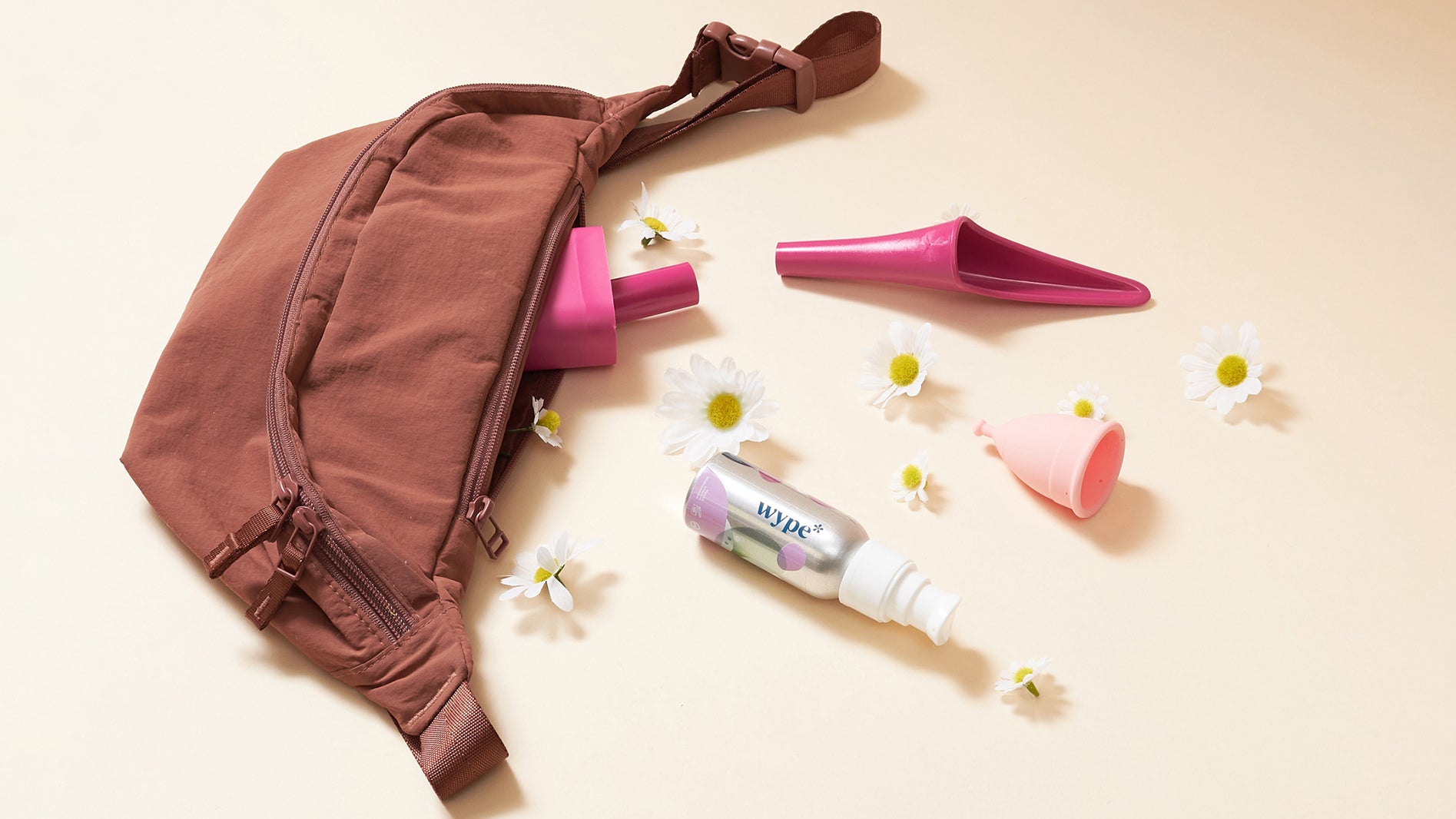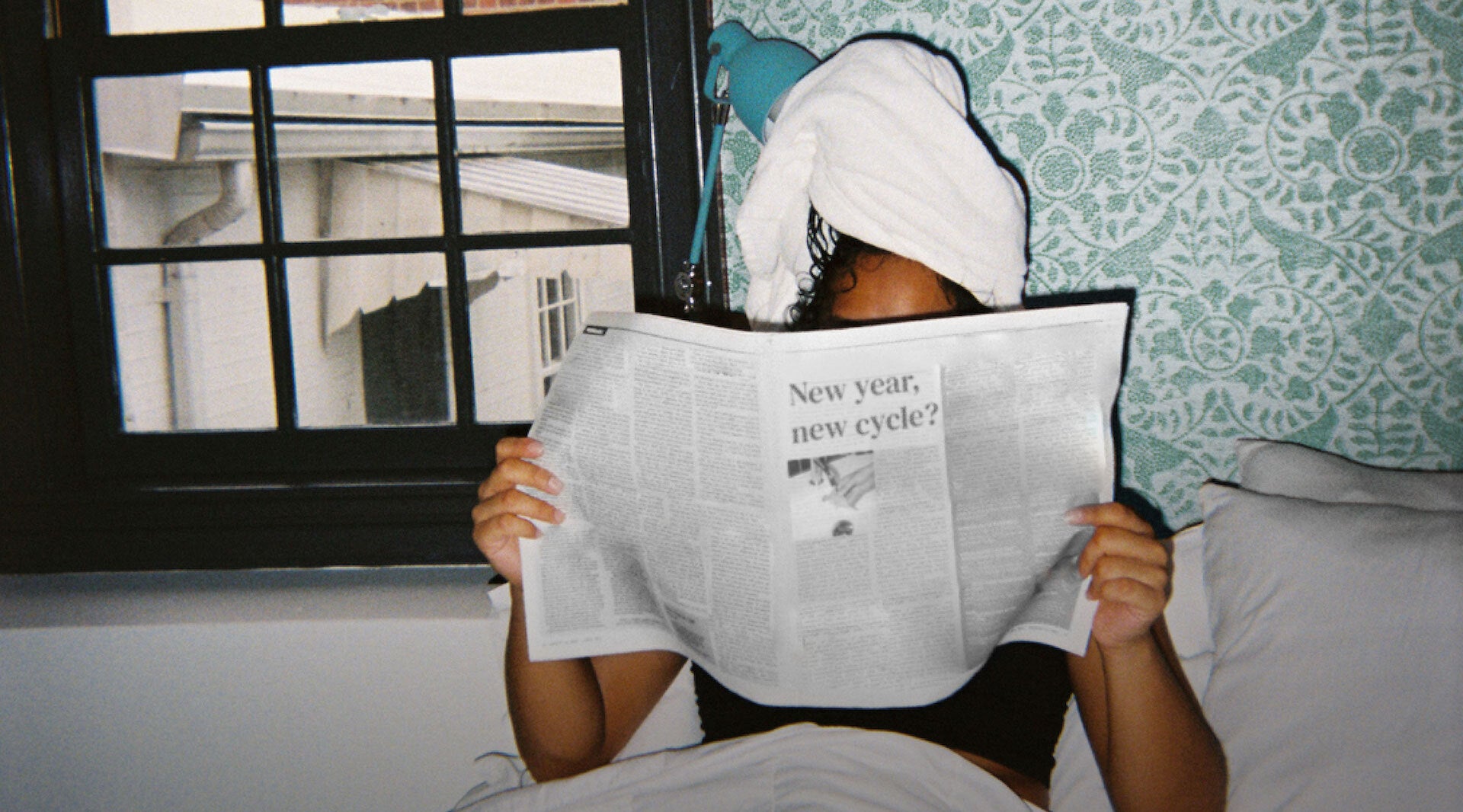‘The Change’, ‘that time of your life’, ‘Aunt Flo’s grand departure’… here at Mooncup we have heard the menopause called many things! Going through the menopause marks the transition from one phase of life to another, and while this can mean getting your head around a whole new set of physical changes (and challenges) it can also mark the start of a new era of freedom and liberation!
To mark World Menopause Day we’ve delved into the mysteries of the menopause, explored what you can expect when the perimenopause comes calling, and looked at some suggestions around how you can holistically manage this new transition.
A time of transition
As well as the impact hormonal changes can directly have on our mood, the significance of coming towards the end of the reproductive phase of life and moving into a new era is a deeply personal experience and will affect each person very differently. One of the most important things can be to acknowledge that you are going through a time of very significant transition, and as such expecting yourself to feel and behave in the same way is both unlikely and counter-productive! Giving yourself space and permission to process and find a new balance with this new world order can help enable you to reconnect with yourself at what is often a very busy time of our lives. The Red Schools’ Alexandra Pope and Sjanie Hugo Wurlitzer have written a great article all about this.
The menopause can often coincide with other transitional phases that life brings; changes in our caregiving role, reviewing our relationships and re-visiting where we are on the road of life can mark a crossroads of opportunity and metamorphosis. For many people, the sense of liberation both from the physical demands of the menstrual cycle and contraceptive choices can open up a new life chapter in itself, where self-care and personal growth are given higher value and focus. The years following the menopause are sometimes referred to as the wisdom years – a time when the knowledge, power and personal truth accumulated over the years can be fully recognised, valued and taken forwards. Dr Christianne Northrup, in her book ‘Women’s bodies, Women’s wisdom’ describes how “in Celtic cultures the role of the post-menopausal woman was to go forth and re-seed the community with their concentrated kernel of truth and wisdom”, so perhaps it’s not surprising that this can often be a time when we become more involved with community groups, social activism and charitable projects.
What is the menopause?
So, what exactly do we mean by the menopause? Menopause is the term used to describe when periods come permanently to a stop (literally the end, or ‘pause’ of menstruation) and becoming pregnant naturally is no longer possible. You are considered to have entered the menopause when your periods have been absent for 12 months or more. It is usually a natural part of becoming older and most commonly occurs between the ages of 45 – 55, with the average age in the UK thought to be 51. However, some people may experience the menopause earlier in life either naturally or as a result of medical issues or treatment, with 1 in 100 going through this before the age of 40. This is called early or premature menopause.
As we get older, the number of eggs stored in the ovaries decreases, eventually affecting fertility and how easy it is to conceive.
As the menopause approaches, the overall amount of oestrogen produced by the ovaries gradually decreases and a new phase of our reproductive life begins- perimenopause. Before your periods permanently stop, your body goes through a time of adjustment called perimenopause (the length of which can vary from person to person). During this time hormone levels adjust and go through a time of flux; this can result in the physical and emotional signs and symptoms we commonly think of when someone says they are ‘going through the menopause.
Perimenopause can vary in length, with the average time thought to be around 4 years. However, some people may experience it over a shorter or much longer time- as with most things related to the menstrual cycle each person’s experience will be different and dependent on a number of different health, genetic and lifestyle factors. Unless you are being medically monitored or treated, the most likely signs that you are moving into this phase are be changes in your body, menstrual cycle or mood etc. and for most people, these signs will appear gradually.
What are the signs you’re entering the perimenopause?
As we head into the perimenopause, oestrogen levels initially fluctuate, and the rise and fall can lead to some interesting results! How each person experiences this will be very individual, and it may be that other life events and factors mean we put the signs and symptoms of entering this phase down to stress or being very busy. Below are some of the most commonly reported signs:
- Periods becoming more irregular: this can be in terms of how frequent, heavy or long they are.
- Hot flushes: a sudden feeling of heat radiating through the body, with no apparent cause. This can also happen at night, resulting in night sweats.
- Mood changes: some people experience more anxiety or low mood episodes at this time as oestrogen interacts with chemicals in our mood-influencing brain receptors.
- Changes in sleeping pattern: fluctuations in levels of oestrogen, progesterone and other sleep-promoting hormones around this time can make getting a good quality night’s sleep challenging for some. This can also be exacerbated by night sweats and mood changes such as anxiety.
- Problems with memory and concentration: Many people report having ‘brain fog’ or a feeling of ‘wading through treacle’ around menopause. Mood changes, a lack of good quality sleep and night sweats can also affect this too.
- Vaginal dryness: the reduction in oestrogen can lead to the vagina becoming less lubricated, causing irritation, itching and discomfort during sex.
- Reduced libido (sex drive): as well as oestrogen, changes in testosterone and progesterone hormone levels at this time can also play a part.
- Urinary issues: reduced oestrogen levels can affect the tone of the bladder and urethra and how they control urinary functions. This can include finding it harder to hold urine in, a sudden and overwhelming urge to pass urine (urge incontinence) or accidentally having some urinary leakage when laughing, coughing or exercising (stress incontinence).
People may experience a range of other symptoms too; for some, the effect on everyday life will be minimal, whereas others will find the symptoms and their effect can be a lot more significant. However, there are lots of things that can help with managing these symptoms and make the transition a smoother and more comfortable experience.
Things that can help with the menopause
Depending on what you are experiencing and how much it affects your life, there are lots of things you can utilise to help make navigating the transition to menopause easier. However, it’s important to know that if you are finding symptoms particularly troublesome, or they are having a significant negative impact on your life you should discuss this with your doctor who will be able to advise you on treatment options to help.
Dealing with irregular periods
“I thought we knew each other?!” While some people experience irregular periods throughout their life, others may find that their menstrual cycle that once ran like clockwork is now free-styling! This can mean having longer or shorter spaces between periods, much lighter or heavier periods, or a longer or shorter number of days of menstrual bleeding. Keeping track of your menstrual cycle and periods can help you understand how their pattern is changing and feel more in tune- you can do this simply on paper or in a diary, or some people choose to use one of the many period tracker apps available.
Not knowing quite what to expect from your period can sometimes influence choosing the right menstrual product for you. The Mooncup menstrual cup can be a great option at this time, as it collects menstrual fluid rather than absorbing it, meaning you can use it no matter how heavy or light your menstrual flow is. It can also collect up to three times the amount of a regular tampon which can be particularly helpful for those heavy days! The measurement markings on the Mooncup can also be used to roughly measure how heavy your flow is, which can be helpful to share with your doctor if you have any concerns about this.
Remember if you are concerned that your bleeding is too heavy, lasting more than 7 days, or you are experiencing periods more often than every 21 days or less often than every 35 days it’s best to speak to your doctor about this.
Beating the heat of the menopause
Sometimes taking simple measures such as wearing light-weight, breathable clothing (ideally layers so you can remove them if necessary), taking a cool shower or running your hands under cool water, or having a cool drink to hand can help combat those sudden flashes of heat. At night keeping your room cool and using breathable bedding and nightclothes can help reduce discomfort. Recognising and avoiding potential triggers such as consuming spicy foods, alcohol and caffeine, and stopping smoking can also be beneficial.
Eating well
Try and eat as balanced and healthy a diet as you can. While this might sound like general advice for life, this can not only help you manage symptoms such as tiredness, sleep difficulties and mood changes during the perimenopause, but also help protect you from potential longer-term health issues such as Cardiovascular disease and Osteoporosis which can be initiated by lower oestrogen levels. Eating plenty of vegetables, fruit and wholegrains, lowering your saturated fat and salt intake, and getting enough calcium, iron and vitamin D are all important. Some people find it helpful to take specific supplements at this time- it’s best to discuss this with your doctor for tailored advice.
Perimenopause and bladder problems
To help combat those sudden or frequent trips to the toilet, and help you get a better night’s sleep, simple measures such as reducing your caffeine and alcohol intake (which can lead to the bladder filling up rapidly) and trying to stay well hydrated during the daytime so that you don’t drink lots of fluids just before bed-time can all be beneficial. Strengthening the muscle tone of our pelvic floor, the hammock that helps support our reproductive and urinary organs, can also help reduce urinary symptoms.
Vaginal dryness
Using perfumed soaps, washes or vaginal douches can all affect the natural moisture levels and pH of the vagina and vulva so it’s best to give these a miss. If vaginal dryness is causing irritation or itching, some people find using a vaginal lubricant or moisturiser can help them feel comfortable- these can be found in most pharmacies and don’t require a prescription.
If you are a tampon user, you are likely to know the uncomfortable feeling of pulling out a dry tampon. Alongside menstrual blood, tampons can also absorb up to 35% natural, vaginal moisture. The Mooncup menstrual cup is non-absorbent so it doesn’t dry you out or cause dryness when your period’s light. It doesn’t leave irritating fibres behind either. If your symptoms are not relieved by simple measures, the next step is to have a chat with your doctor as they’ll be able to go through some of the other options available.
Hormonal fluctuations throughout the menopause
Our hormones work together in a complicated and interconnected dance, so although oestrogen isn’t directly connected with mood, changes in its levels can often have a knock-on effect on those hormones that do. For those experiencing mild mood swings, anxiety or episodes of low mood, self-help measures can help make this more manageable. This can include exercising more regularly in a way that you enjoy, taking part in relaxation activities such as gentle yoga, tai chi or meditation and getting plenty of rest. If you feel that your mood changes are negatively impacting your life, it’s important to discuss this with your doctor and they’ll be able to go through options to help manage/ treat this.
Blog disclaimer
Our blog is intended to share information and ideas around periods, health, and sustainability. While we do our best to keep content accurate and up to date, things can change over time. The information here is not intended as medical advice — for any health-related concerns, please consult a qualified healthcare professional. For more information on our claims, please see our Claims Page, and for the most up-to-date product information, please visit our Product Pages.





